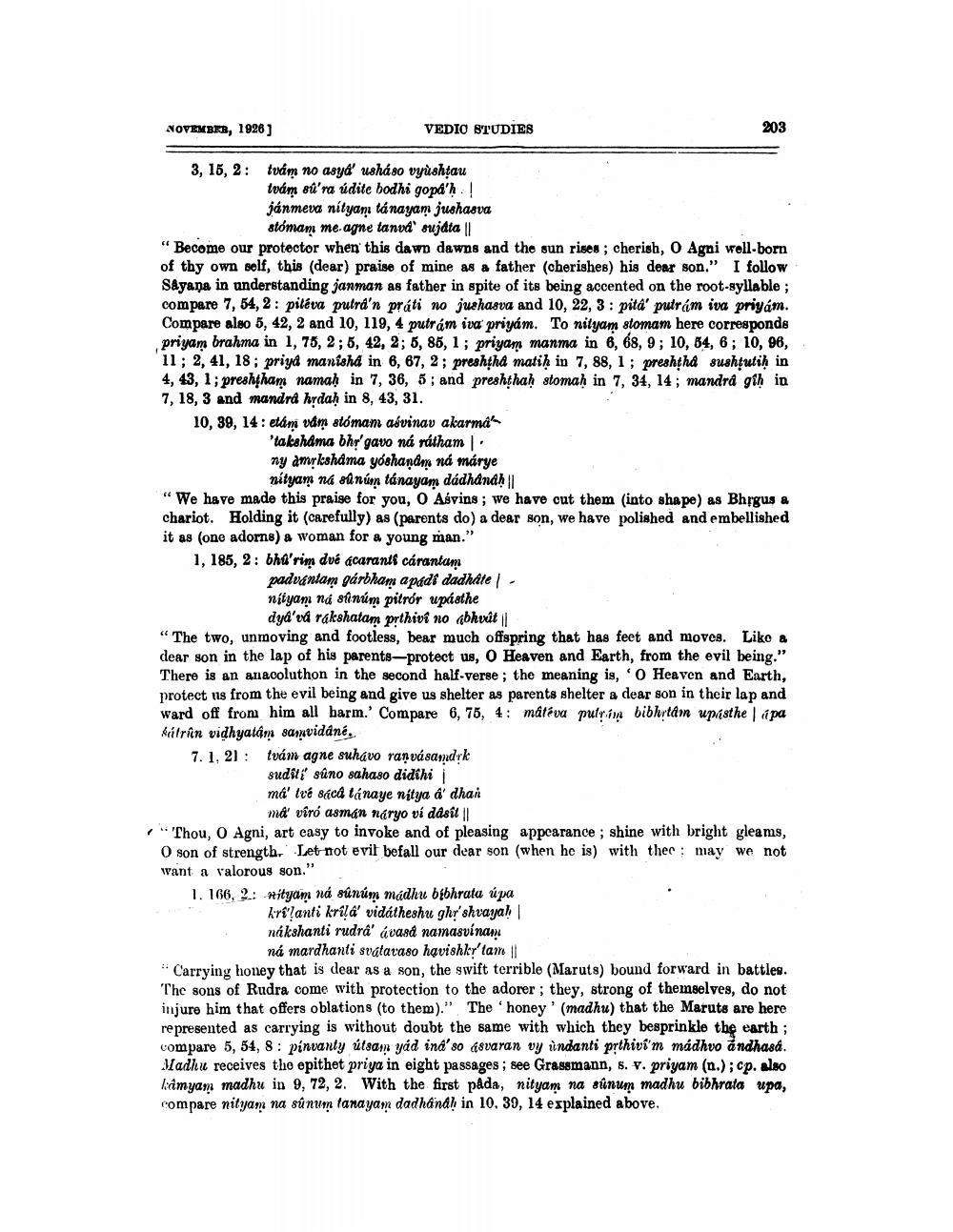________________
NOVEMBER, 1926)
VEDIO STUDIES
203
3, 15, 2: tvám no asyd' ushá so vyúshtau
tvám sú'ra údite bodhi gopa'h ! jánmeva nityanı tanayam jushasva
stómam me.agne tanva sujata | "Become our protector when this dawn dawns and the sun rises ; cherish, O Agni well-born of thy own self, this (dear) praise of mine as a father (cherishes) his dear son." I follow Sayana in understanding janman as father in spite of its being accented on the root-syllable ; compare 7, 54, 2: piléva putra'n práti no jushasva and 10, 22, 3 : pita' putrám iva priyam. Compare also 5, 42, 2 and 10, 119, 4 putrám iva priyám. To nityam stomam here corresponde priyam brahma in 1, 75, 2, 5, 42, 2; 6, 85, 1; priyam manma in 6, 68, 9, 10, 54, 6; 10, 96, 11 ; 2, 41, 18; priya manisha in 6, 67, 2; preshtha matih in 7, 88, 1 ; preshtha sushțutih in 4, 43, 1; preshtham namah in 7, 36, 5; and preshthah stomah in 7, 34, 14 ; mandra gth in 7, 18, 3 and mandra hrdaḥ in 8, 43, 31. 10, 39, 14: etám vam stómam ašvinav akarma
'takshama bhr' gavo ná rátham | ny amokshama yoshanam ná márye
nityam na sinun tánayam dádhandh || “We have made this praise for you, O Asvins ; we have cut them (into shape) as Bhrgus a chariot. Holding it (carefully) as (parents do) a dear son, we have polished and embellished it as (one adorns) a woman for a young man." 1, 185, 2: bha'rim dvé acaranti carantam
padvantam gárbham apadi dadhate - nityam na slinúm pitrór upósthe
dya'ua rakshatam prthivi no abhvật | “The two, unmoving and footless, bear much offspring that has feet and moves. Liko a dear son in the lap of his parents—protect us, O Heaven and Earth, from the evil being." There is an anacoluthon in the second half-verse; the meaning is, 'O Heaven and Earth, protect us from the evil being and give us shelter as parents shelter a dear son in their lap and ward off from him all barm. Compare 6, 75, 4: mátéva putyin biblrtám upristhe vipa Gritrîn vidhyatám samvidané. 7. 1. 21: tvám agne suhavo ranvásamdyk
suditt sûno sahaso didihi i má' tvé saca lánaye nitya á' dhan
má víró asmán náryo ví dasît | "Thou, O Agni, art easy to invoke and of pleasing appearance; shine with bright gleams, O son of strength. Let not evit befall our dear son (when he is) with thec : may we not want a valorous son." 1. 166, 2.: nityam ná súnúm madhu bíbhrata úpa
kri'lanti krild' vidátheshu ghr' shvayah nákshanti rudra' avasd namasvinam
ná mardhanti svatataso havishkr'tam || ** Carrying honey that is dear as a son, the swift terrible (Maruts) bound forward in battles. The sons of Rudra come with protection to the adorer; they, strong of themselves, do not injure him that offers oblations (to them)." The 'honey' (madhu) that the Maruts are here represented as carrying is without doubt the same with which they besprinkle the earth; compare 5, 54, 8: pinvanty útsam yad iná' so asvaran vy undanti prthivi'm madhvo andhasa. Madhu receives the epithet priya in eight passages ; see Grassmann, s. v. priyam (n.); cp. also kamyam madhu in 9, 72, 2. With the first pada, nityam na sinum madhu bibhrata upa, compare nityam na súnum tanayam dadhanah in 10, 39, 14 explained above.




